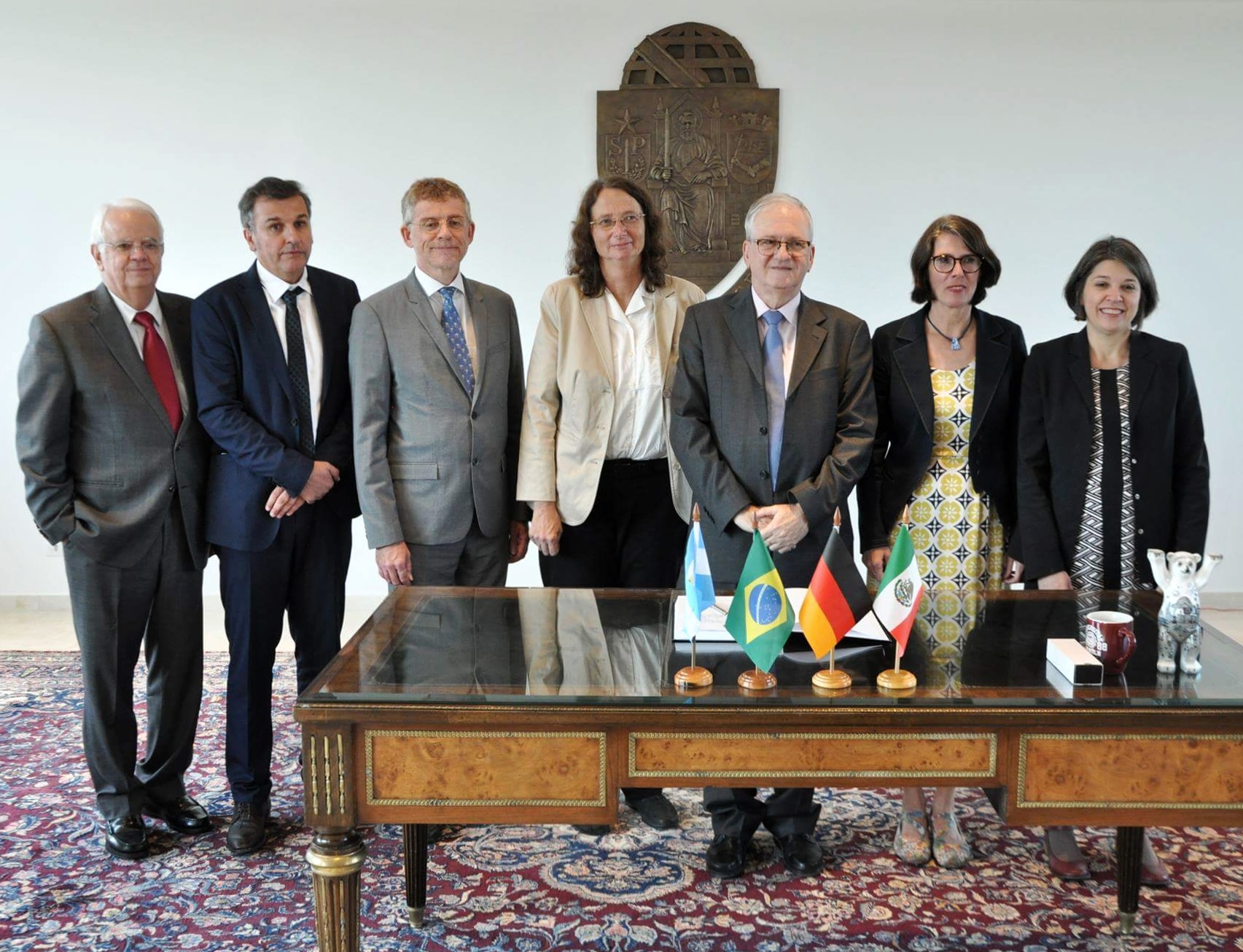Merian Research Group in São Paulo Researches Co-Existence in Unequal Societies
(27.04.17) On 3 April, a new Maria Sibylla Merian research group was formally launched at a ceremony held in the Office of the Rector of the University of São Paulo (USP). Following its establishment in the Brazilian metropolis, the “Maria Sibylla Merian International Centre for Humanities and Social Sciences Conviviality in Unequal Societies: Perspectives from Latin America” will be funded for up to twelve years as part of the funding line from the Federal Ministry of Education and Research (BMBF) for the development of scientific centres in Asia, Africa and Latin America and the Caribbean.

(L to R) Dr. Raul Machado, Dr. Sergio Costa, Axel Zeidler, Dr. Brigitta Schütt, Dr. Marco Antônio Zago, Dr. Barbara Potthast and Dr. Angela Alonso
The research group is based at the USP and led by an international consortium. The Free University of Berlin (FU Berlin) has responsibility for coordinating the group; other consortium partners are the University of Cologne, the Ibero-American Institute of the Foundation of Prussian Cultural Heritage, the University of São Paulo, the Centro Brasileiro de Análise e Planejamento (Cebrap/Brazil), the Argentinian Instituto de Investigaciones en Humanidades y Ciencias Sociales (Universidad de La Plata/Conicet) and the Mexican Colegio de México.
The consortium’s proposal for project funding was submitted and approved as part of the BMBF’s call in October 2015. Given the competencies of the DFG Office Latin America in respect of research collaboration in this region, expert advice was sought from a DFG representative on the Ministry’s selection and review process.
The core research area of the group will be the challenges posed by co-existence in societies characterised by major inequalities and by cultural, religious and ethnic differences.
The science centre is in part the outcome of previous international scientific cooperation, notably the International Research Training Group “Entre Espacios”, which has been funded by the DFG and its Mexican partner organisations since 2009. In the course of the programme, collaboration has been established between the FU Berlin and El Colegio de México – both institutions are taking part in the consortium of the Research Group and are cooperating at an institutional level.
From the DFG’s perspective, the launching of the research group contributes to strengthening academic relationships in the humanities and social sciences between German and Latin America. In addition, it will create opportunities for collaboration on future joint projects between outstanding researchers from both regions.
Subject of the research: Social differences and inequality
The spokesperson for the consortium, Prof. Dr. Sérgio Costa (FU Berlin), explained during the opening ceremony that it was no small matter to have atheists and believers, sexists, homosexuals and transgender people, xenophobic people and migrants living together in the same city, sometimes even living in the same building, and therefore also sharing physical and social spaces. “In the new research group, we would like to research interpersonal interactions in contexts that are not only diverse, but also extremely unequal. Diversity and inequality have been integral components of Latin American societies since colonial times,” Costa says.
Since aspects of interactions are to be investigated on a variety of levels, researchers from the fields of culture and literature as well as legal and political sciences, sociology, philosophy, history, economics and gender studies are taking part in the research group. The BMBF funding guidelines envisage a set-up phase of three years, in which the research programme is to take concrete shape. If this phase is concluded successfully, the research group can be funded for a further six or nine years. In this period, alongside the regular staffing for coordination and research, each year around ten visiting researchers from all parts of the world will be invited to work together within the framework of the project.
One of the objectives of the new research group is the reduction of the asymmetry between the Global North and the Global South in producing and disseminating knowledge. A further goal is strengthening scientific collaboration between Germany and Latin America, as well as between Brazil and the Spanish-speaking countries. “”In view of the social and political significance of the topic we are dealing with, we can also make a contribution to public debate, as well as to the design of the appropriate policies,” Prof. Dr. Costa explained.
The Consul General of the Federal Republic of Germany in São Paulo, Alex Zeidler, also took part in the opening ceremony. In addition, representatives of the participating institutions were invited. The USP was represented by its Rector, Marco Antônio Zago and the President of the Department for National and International Scientific Collaboration, Prof. Dr. Raul Machado. Vice President Prof. Dr. Brigitta Schütt attended on behalf of the FU Berlin, as well as Prof. Dr. Barbara Potthast of the University of Cologne as the head of the Department for Iberian and Latin American History at the Historical Institute. Cebrap was represented by its President, Prof. Dr. Angela Alonso.
More information on the Research Group is available on the website of the Free University of Berlin: